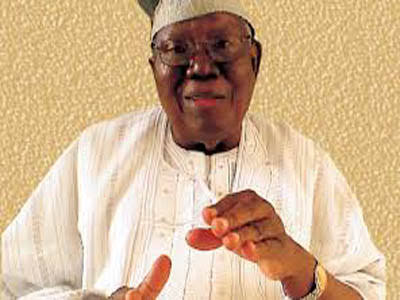
How Shagari Made Adewusi Nigeria’s Youngest IGP @45 – Alao-Akala
By DAPO FALADE
The late Chief Sunday Adewusi became the youngest ever to rise to the rank of the Inspector General of Police in Nigeria due to his sterling performance in ending the bloody activities of the dreaded Maitatsine group in the northern part of the country during the Second Republic.
The late President Shehu Shagari, appointed the late Adewusi as the substantive IGP on April 1, 1981, to replace Adamu Suleiman who was then acting in that capacity, in recognition of his efforts at maintaining Nigeria’s internal security at that period.
A former governor of Oyo State, Chief Adebayo Alao-Akala, made the disclosure in his autobiography, ‘Amazing Grace’, recently launched in Ibadan, saying the late Adewusi became the IGP at the age of 45, making him the youngest ever to get to that rank.
Alao-Akala, who was the ADC/Personal Assistant to the late Chief Adewusi, wrote in the book that the successful onslaught against the Maitatsine group marked the turning point in the career of the late police boss, making it possible for him to become the IGP.
The former governor, who voluntarily retired as an Assistant Commissioner of Police in 1995, further disclosed that he was with Adewusi (then AIG FEDOPS) as the Operations Officer when the police were drafted to Kano to quell the Maitatsine uprising in December, 1980.
He said police officers were being killed by Maitatsine elements, using bows and arrows, not guns and the police could not infiltrate the enclave of the enemy because it was designed in such a way that it confused outsiders.
“The operation was in jeopardy until Adewusi came up with a plan. He quickly wrote a letter to the acting IGP, Adamu Suleiman, the [then] Kano State governor, Abubakar Rimi and the president, Usman Shehu Shagari.
“In the letter, he requested the help of the Nigerian Army to mobilise its armoured car fleet to assist the operation for only a week, and the rest, he promised, the police would accomplish.
“When this request was granted, Adewusi briefed the army about the operation. At the time, Brigadier Ibrahim Babangida [former military president] was the Commander of the Nigerian Army Armoured Corps.
“He [Babangida] had made a name earlier with the bravery he displayed when he led the Army Armoured Corps to flush out the leader of the failed coup of February 13, 1976 from the studios of Radio Nigeria, Ikoyi,” Alao-Akala wrote.
He said the police used the armoured cars to protect themselves against the arrows of the enemies, adding that the cars were formed as walls on the left and right flanks so that the police were not hit by the poisonous and deadly arrows.
He also disclosed that the shield also enabled members of the police who had local knowledge of the area to lead the charge and onslaught against the Maitatsine stronghold.
“That was all the AIG FEDOPS, Adewusi needed! The police then demolished the Maitatsine fortress and completely wiped it out. Over 4000 lives were lost in that single operation.
“The police put an end to the needless slaughter that the Maitatsine were reputed for. President Shagari was highly pleased and so was the Kano State governor, Abubakar Rimi and the entire Nation of Nigeria.
“The outcome was similar to the result of [the Biblical] David’s victory over Goliath. Nigerians were full of praises for Adewusi, from the corridors of power to major streets in the country.
“In a moment when he was needed, he had risen to the occasion. To the powers-that-be, he had demonstrated immense capacity to manage men and materials. By this time, I had become his personal assistant.
“The full report of the operation got to President Shagari on how Maitasine was defeated. The report highlighted Adewusi’s pivotal role and strategy which brought the army and the police to collaborate successfully for the first time.
“Meanwhile, immediately after the defeat of the Maitatsine insurgents, Mr. Adewusi wrote another report to the acting IGP and the president. In this letter, he requested that the Federal Government funded the police to enable them acquire armoured cars and Armoured Personnel Carriers (APC).
“The report contained other far-reaching recommendations that would ensure that the police was well equipped to guarantee the internal security of the country and defend the nation’s democracy.
“President Shagari was impressed and it was agreed that Adewusi be made IGP to implement his ideas for the police. The IGP at that time, Suleiman, was only in acting capacity.
“He [Suleiman] was consequently removed and Mr. Adewusi was promoted to IGP on April 1, 1981. He is the youngest IGP in the history of the nation as he was only 45 at that time,” the former Oyo State governor wrote.

Leave a Reply